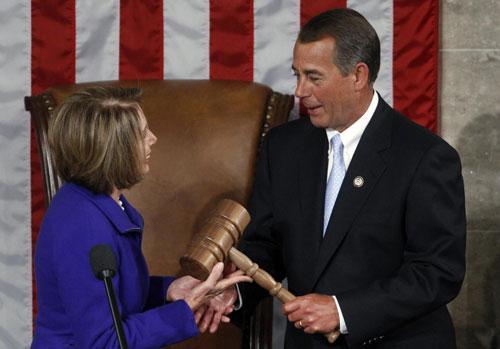Politics
Republicans get control of US Congress
Updated: 2011-01-06 07:59
By Steven R. Hurst (China Daily)
WASHINGTON - Republicans take charge of the House of Representatives on Wednesday, poised for head-to-head clashes with President Barack Obama as it promises an era of smaller government and less spending.
Democratic leader Nancy Pelosi turns over her speaker's gavel to Republican John Boehner, who plans to quickly stage a vote to repeal President Barack Obama's signature healthcare overhaul, fulfilling promises the party made in the November election that put it back in control of the lower house.
|
|
"House Republicans are expected to vote next week - without hearings - that we are delivering jobs for the American people and that we are creating a competitive economy for the 21st century," Obama said on Tuesday on his return flight from a two-week family holiday in Hawaii.
He said the two sides can build on the final session of the previous Congress late last year, when they agreed on a compromise to prevent income taxes from rising, extend unemployment benefits and enact a Social Security tax cut that took effect on Saturday.
Perhaps coincidentally, Obama's job approval rating has climbed to 50 percent according to the latest Gallup Poll tracking survey. The president's approval number had been in the mid-40s for most of the last six months. He was last at the 50-percent mark in late spring.
Many politicians believe Americans are hungering for a more bipartisan political climate.
For her part, however, Pelosi was still stoking the partisan fires as she prepared to vacate the federal budget deficit. The deficit hit $1.3 trillion in the budget year that ended in September - a year in which Democrats controlled Congress and the White House.
For the Republicans, incoming Majority Leader Eric Cantor said he hoped Obama would "reevaluate his position on regulations".
The party contends the economy is over-regulated by the government, with Obama's healthcare legislation a key example.
Cantor's comments signaled the change in political realities since the 2008 election which gave Democrats control of the White House and both houses of Congress.
Instead of opposing Obama's every proposal - as they did in 2009 and 2010 - Republicans now must compromise with him if they are to show results in their drive to cut spending.
Across the Capitol, the Senate opens for business with the Democrats' majority down from 60 votes two years ago to 53 - making it harder to enact legislation Obama seeks. But administration officials must explain how they are spending the public's money. The friendly tone of inquiry from Democratic chairmen will be replaced by Republicans demanding answers to these questions: What's the purpose of this program? Is this the best use of the taxpayers' money?
The chief Republican investigator, Republican Darrell Issa, is eager to get started - and he's not alone. Issa, the incoming chairman of the House Oversight and Government Reform Committee, has been especially critical of what he calls waste in Obama's economic stimulus spending.
More broadly, conservative Republicans, including many newly elected members of Congress backed by the conservative tea party movement, want spending cuts imposed immediately.
The first spending cut vote is set for Thursday, a five percent reduction in the amount ticketed for lawmakers' and committees' offices and leadership staff. Aides estimate the savings insurance program for the elderly and defense spending, account for a lion's share of the federal budget.
As Congress geared up, Obama was preparing a shake-up of his senior leadership, looking toward the 2012 election campaign.
Obama's press secretary, Robert Gibbs, was expected to leave that position and there was word interim chief of staff Pete Rouse might also leave his post.
Obama was considering naming former Commerce Secretary William Daley to a top White House job, possibly chief of staff, a person familiar with the matter said.
Associated Press
(China Daily 01/06/2011 page12)
Specials

President Hu visits the US
President Hu Jintao is on a state visit to the US from Jan 18 to 21.

Ancient life
The discovery of the fossile of a female pterosaur nicknamed as Mrs T and her un-laid egg are shedding new light on ancient mysteries.

Economic Figures
China's GDP growth jumped 10.3 percent year-on-year in 2010, boosted by a faster-than-expected 9.8 percent expansion in the fourth quarter.
